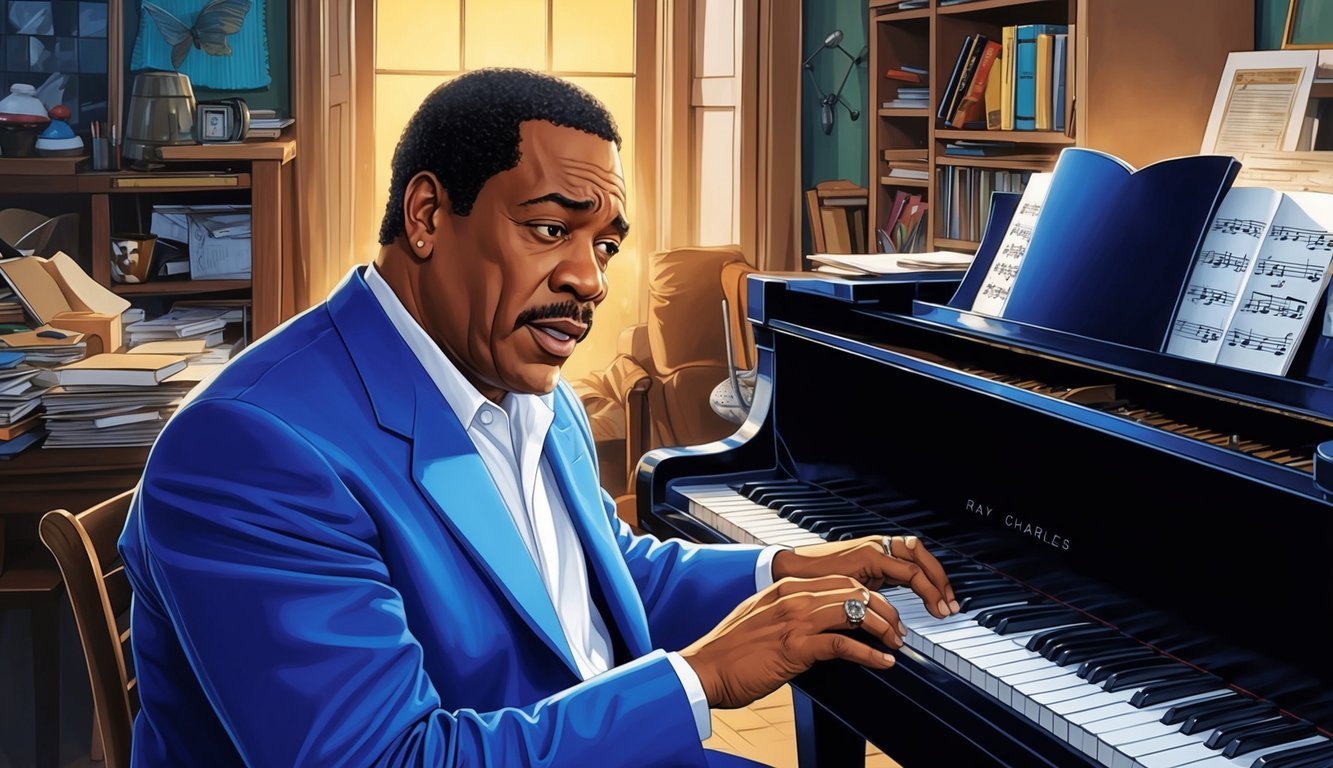Ray Charles was not just a musician; he was a revolutionary figure in the world of music. His unique blend of gospel, rhythm and blues, and jazz helped create the soul music genre, leaving an indelible mark on the music industry.
Born in Albany, Georgia, on September 23, 1930, Ray faced numerous challenges, including losing his sight at a young age.
Despite these obstacles, he rose to become one of the most influential artists of his time.

Throughout his career, Charles produced countless hits, many of which remain classics today.
His songs like “Hit the Road Jack” and “Georgia on My Mind” showcase his exceptional talent and passion for music.
He not only entertained millions but also inspired future generations of musicians, proving that perseverance can lead to greatness.
Ray Charles’s life was a mix of triumph and struggle, and his story is a fascinating journey through the evolution of modern music.
His legacy continues to influence artists across genres, reminding everyone of the power of talent and determination.
Key Takeaways
- Ray Charles transformed music with his innovative soul sound.
- Despite personal struggles, he achieved immense commercial success.
- His influence remains strong in today’s music industry.
Early Life and Musical Beginnings
Ray Charles, born on September 23, 1930, faced challenges from a young age.
His early experiences and environment shaped his music and style.
Key aspects include his childhood in Georgia, education at a specialized school, and his first ventures into the music world.
Birth in Albany, Georgia and Childhood
Ray Charles was born in Albany, Georgia.
He grew up in a poor family and faced difficulties from an early age.
His younger brother died when Ray was just a child, which deeply affected him.
At the age of five, Ray began to lose his sight due to glaucoma.
By the time he was seven, he was completely blind.
Despite this, he showed a passion for music early on.
Growing up in a segregated southern town, he was influenced by gospel music from local churches, which would later shape his sound.
Education and Formative Years
Ray’s education took a significant turn when he attended the Florida School for the Deaf and the Blind in St. Augustine.
At this school, he developed his musical skills.
He learned to play various instruments, focusing mainly on the piano.
Ray’s teachers recognized his talent and supported his development.
They encouraged him to understand different genres and musical styles.
This environment allowed him to explore music deeply, nurturing his passion and creativity during his formative years.
First Steps in Music: McSon Trio and Early Recordings
Ray Charles’s first major music group was the McSon Trio, which he formed in his late teens.
They performed in clubs and bars across Florida.
This exposure helped him gain experience and confidence in his abilities.
Around this time, he recorded his first tracks, including “Confession Blues.” This song marked a turning point in his career, leading to greater recognition.
His unique blend of gospel, rhythm, and blues attracted an audience and laid the groundwork for soul music.
Rise to Fame and Musical Evolution
Ray Charles’s journey to fame was marked by his unique sound and innovative style.
His ability to blend different musical genres set the stage for his rise in the music industry, and he became a key figure in soul music.
Breaking Through with ‘I Got a Woman’
In 1954, Ray Charles released “I Got a Woman,” a song that showcased his distinctive blend of rhythm and blues with gospel influences.
This track was pivotal, marking his first major hit.
The song’s powerful energy and heartfelt lyrics resonated with many listeners, establishing him as a groundbreaking artist.
The success of “I Got a Woman” caught the attention of Atlantic Records, helping Charles gain recognition.
This partnership allowed him to produce more hits and develop his signature style, paving the way for a successful career in music.
The Genius of Soul Music Emerges
Ray Charles earned the nickname “The Genius” due to his exceptional talent and contributions to the genre of soul music.
He combined elements of jazz, blues, and gospel, creating a new sound that was both fresh and captivating.
His ability to evoke deep emotions through his music set him apart from other artists of his time.
Songs like “Hit the Road Jack” and “Georgia on My Mind” became iconic, showcasing his versatility.
The emotional depth in his performances helped him build a loyal fan base.
With each release, he further refined his sound, leading him to become a central figure in the evolution of soul music.
Venturing into Other Genres
Ray Charles didn’t limit himself to soul music; he explored various genres throughout his career.
His album Modern Sounds in Country and Western Music, released in 1962, was a bold move.
It featured hits like “I Can’t Stop Loving You,” which demonstrated his ability to connect with different musical styles.
Charles’s ventures into pop and country music broadened his appeal.
His innovative approach allowed him to break down genre barriers, making him a true pioneer.
By merging genres, he changed how audiences perceived music, influencing countless artists after him.
His willingness to experiment played a significant role in his sustained success and artistic growth.
Commercial Success and Artistic Achievements
Ray Charles achieved significant commercial success while redefining music.
His unique style merged various genres, leading to numerous hit singles and recognition by prestigious awards.
Grammy Awards and Accolades
Ray Charles received 13 Grammy Awards throughout his career.
His album, Genius Loves Company, won Album of the Year in 2005.
This album featured collaborations with many artists and showcased his versatility.
In 1979, he also received a Lifetime Achievement Award, cementing his status as a music legend.
His song “Georgia on My Mind” is iconic and was designated as the state song of Georgia.
In 1960, it reached the top of the Billboard Hot 100, highlighting Charles’s ability to connect with a broad audience.
His influence is seen in awards and honors well beyond music, including his 1986 induction into the Rock and Roll Hall of Fame.
Iconic Performances and Collaboration
Ray Charles’s live performances were powerful and unforgettable.
He captivated audiences with his emotional delivery and piano skills.
Notable performances included appearances on The Ed Sullivan Show and Saturday Night Live, introducing him to new fans.
Charles often collaborated with other artists, creating memorable music.
His duets with singers like Billie Holiday and Johnny Cash showcased his adaptability.
These collaborations helped bridge musical styles, contributing to his legacy.
Through these performances and collaborations, Ray Charles solidified his place as a pioneer in music history, influencing countless musicians who followed.
Personal Life and Struggles

Ray Charles lived a life filled with talent and heartbreak.
His journey included intense personal battles, with substance abuse impacting his career and relationships, along with health issues that marked his later years.
Battles with Substance Abuse
Throughout his life, Ray Charles faced significant challenges with heroin addiction.
He started using drugs in his youth, seeking relief from pain and a means to cope.
This addiction led to legal troubles, including arrests for drug possession.
After a pivotal moment in 1965, he entered a rehabilitation program that helped him turn his life around.
His success in overcoming addiction marked a turning point, allowing him to focus more on his music and family.
Family and Relationships
Ray had complex relationships throughout his life, particularly with his family.
He had three children, including Ray Charles Jr., who played an important role in his life.
Charles’s marriages were also difficult, with his first marriage to Della Beatrice Howard occurring in the 1950s.
The couple divorced in 1977.
Despite these challenges, his children remained close to him, and he often expressed love and pride for their achievements.
Health Issues and Passing
In his later years, health issues began to take a toll on Ray.
He suffered from liver failure, which ultimately led to his passing on June 10, 2004, at the age of 73.
His battle with health was compounded by the physical toll of a life spent performing and touring.
Prior to his death, he canceled a tour for hip surgery, marking a significant moment in his long career.
Ray’s life inspired a portrayal by Jamie Foxx in the film “Ray,” highlighting his struggles and triumphs.
Legacy and Influence on Music
Ray Charles left a lasting mark on the music landscape, both through his artistry and his commitment to social causes.
His contributions helped shape genres and inspired countless musicians who followed in his footsteps.
Contribution to Civil Rights and Social Causes
Ray Charles was not just a musical pioneer; he was also an advocate for social change.
During the Civil Rights Movement, he used his fame to support equality.
He refused to perform in segregated venues, promoting integration.
His song “Georgia on My Mind” became a state anthem, symbolizing his love for equality and progress.
In 2004, he established The Ray Charles Foundation to continue his mission of helping underprivileged children.
Through these actions, he proved that music could challenge societal issues and inspire others to join the fight for justice.
Impact on Future Generations of Musicians
Many artists today show Ray Charles’ influence, from Stevie Wonder to modern R&B singers.
His work blended genres like gospel, pop, and country, encouraging musicians to experiment with their sounds.
Charles’ induction into the Rock and Roll Hall of Fame highlights his importance to music history.
His album “Genius Loves Company” showcased his ability to collaborate, influencing other artists to do the same.
His unique style encouraged a generation of musicians to push boundaries, bringing new life to music.
Through his talent and vision, he opened doors for countless others to follow.


